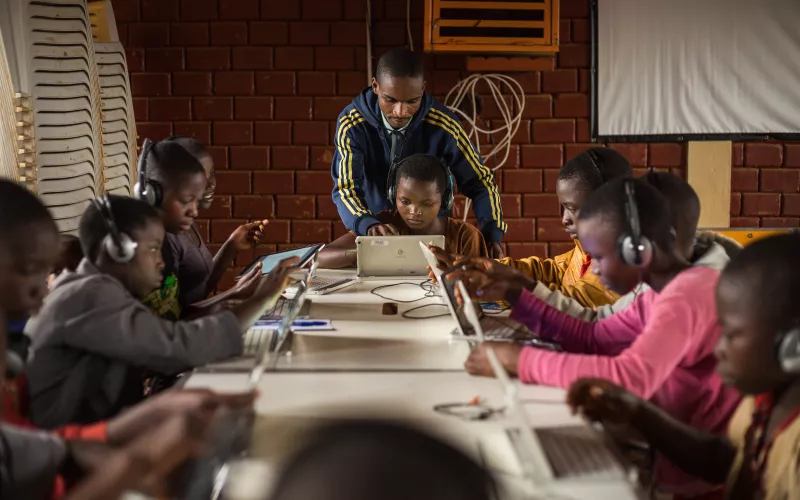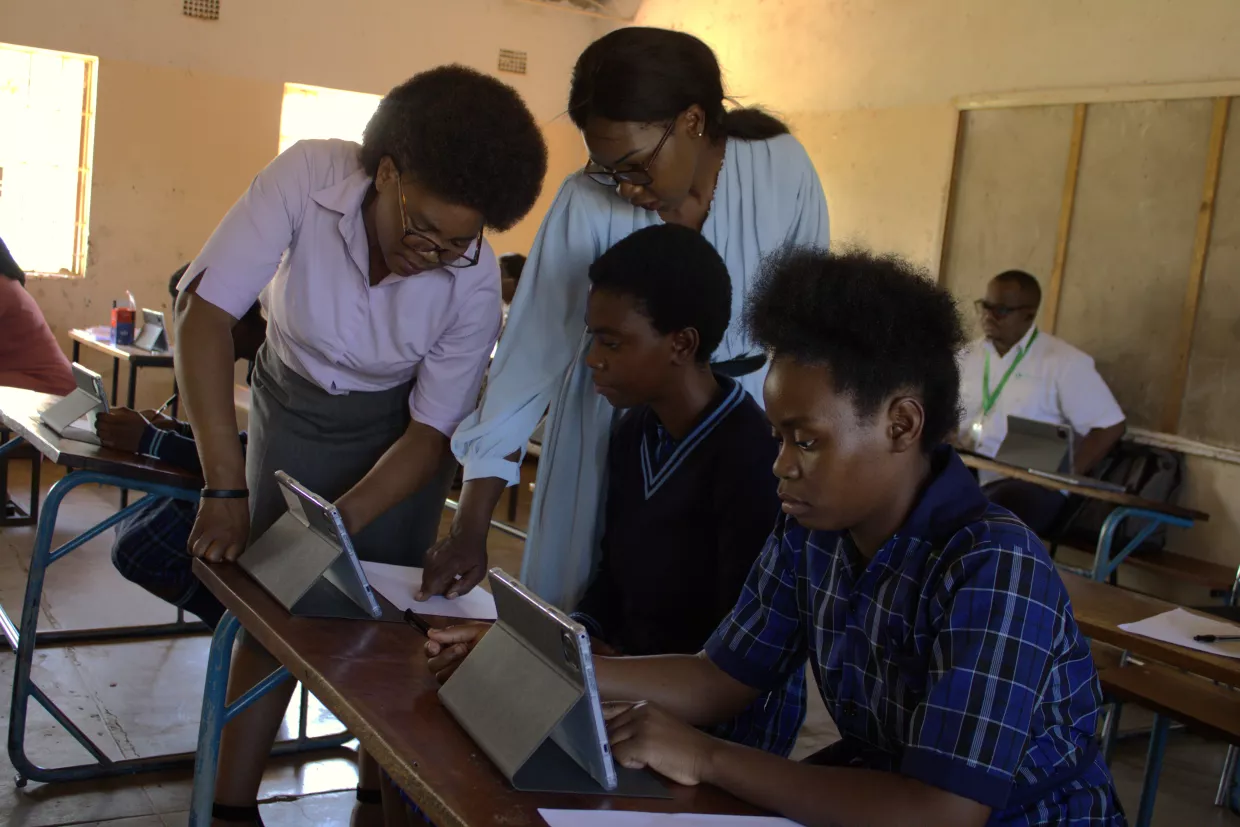Join our newsletter
By subscribing you agree to our Privacy Policy

Information Communication and Technology (ICT) has become a central part of our lives and should be accessible, available and safe for use to all; the digital world cannot grow without the input and participation of girls.
As you wake up in the morning, the first thing you will probably reach out for is your smartphone to switch off that annoying alarm. You will likely get into your WhatsApp, Facebook, Instagram or other social media pages to catch up with what you may have missed out on the previous day or during that night. In Kenya, and many other African countries, you will probably pay for your bus fare to work using mobile money or better still, fuel your car using the same. At the workplace, technology will facilitate collaboration with your colleagues by enabling real-time communication, shared access to information and streamlined workflows, regardless of location, ultimately enhancing productivity and innovation.
However, according to the Analytical Report on ICT based on the 2022 Kenya Demographic and Health Survey (KDHS), the digital divide, or technology gap between men and women/girls and boys is still wide. Girls and women often have less access to technology and the internet compared to boys and men. According to the report for example, girls and women struggle to afford technology and internet access. In addition, stereotypes around technology being ‘for boys’ discourages girls from using digital tools for fear of discrimination. Further, according to the Mobile Gender Gap Report 2023 by GSMA, a global organisation that brings together stakeholders in the mobile ecosystem to foster collaboration, drive innovation and promote the growth of the mobile industry, women in Sub-Saharan Africa were 36% less likely than men to adopt mobile internet, a gender gap that has changed little since 2017.
At the Global level, there is recognition and consensus that ICT plays a critical role in enabling advancements and progress in global economic growth and social inclusion. The role of ICT, especially broadband in accelerating the achievement of the Sustainable Development Goals (SDGs) has been anchored under the global 2030 Agenda for Sustainable Development. The SDGs that have identified ICT as an enabler, include SDG 4 (Ensure inclusive and equitable quality education and promote lifelong learning opportunities for all), SDG 5 (Achieve gender equality and empower all women and girls), SDG 9 (Build resilient infrastructure, promote inclusive and sustainable industrialisation and foster innovation) and SDG 17 (Strengthen the means of implementation and revitalise the Global Partnership for Sustainable Development).
At the continental level, the African Union’s Agenda 2063 on ‘The Africa We Want’ is the continent’s shared strategic framework for inclusive and sustainable development. The framework anticipates Africa to be on equal footing with the rest of the world on matters of ICT. It also envisages an information society with an integrated e-economy where every government, business and citizen have access to reliable and affordable ICT services.
At the national level, Kenya’s long-term development blueprint, Vision 2030, aims to transform the country into an industrialised middle-income economy, offering a high quality of life to all citizens and provides several strategic interventions to promote the development of the ICT sector, including expanding broadband access, promoting e-commerce and e-government.
Despite the frameworks in place, a study report, ‘Bridging the Digital Gender Divide: Include, Upskill, Innovate 2019’ by the Organisation for Economic Co-operation and Development (OECD) indicated that women are under-represented in ICT jobs, top management and academic careers while men are four times more likely than women to be ICT professionals. This male domination exists in schools and business where at 15 years of age, only 0.5% of girls wished to become ICT professionals, compared to 5% of boys. Some root causes for the gender divide include poor access, lack of education, digital illiteracy, ingrained biases and cultural norms. The African Union also identified a similar trend in gender disparities in access to and use of ICT in sub-Saharan Africa with men more likely to own and use technology than women. Based on the data from the Mobile Gender Gap Report 2023 , it is estimated that over 150 million additional women in Sub-Saharan Africa would need to utilise online platforms to close the mobile internet gender gap in the region by 2030, highlighting the need to focus attention on this stubborn and significant divide.
It is now 14 years since the first International Girls in ICT Day was celebrated. The day, which was created by the International Telecommunication Union (ITU), the United Nations (UN) specialised agency for telecommunication, is aimed at drawing attention to the critical need for more girls and women in the ICT sector, thereby encouraging girls to explore careers in this field. However, the gender divide in digital access, digital literacy and ICT education has continued to hinder young women and adolescent girls’ access to the benefits and opportunities that digital technologies offer- educational, social, economic and health resources. Despite efforts to redress the balance over past years, such as providing affordable internet and devices, promoting digital literacy training, encouraging girls and women in Science, Technology, Engineering and Mathematics (STEM) fields and addressing online safety concerns, girls still face barriers to digital training, experience, careers and opportunities due to their gender.

As we mark this year’s International Girls in ICT Day, we must ensure that digital literacy programmes are inclusive and accessible to all, regardless of gender and a call made for girls to be equipped with digital skills for their full, equal and meaningful participation in relation to the digital environment.
To realise the above, we need to start with educating girls equally by pushing digital technology education and actively supporting and promoting girls’ participation in related subjects. This will help ensure that they have equal access to opportunities in the workplaces of the future. Secondly, we must challenge the stereotypes that dissuade girls from studying ICT and ICT-supported subjects through ensuring Gender-Responsive Pedagogy and promoting mentorship for girls so that they can grow up knowing and believing that their gender should not be a barrier to anything they want to become. Application of gender-responsive pedagogy calls for teachers and school leaders to create learning environments where teaching and leadership practices promote gender equity, equality and inclusivity, right from curriculum materials, school set-ups and further, by ensuring continuous professional training of teachers and school leaders in this regard. Partnerships in initiatives such as the Regional Teachers Initiative for Africa (RTIA) are key in this. Lastly, we must close the technology access and usage gap by ensuring that ICT spaces are safe and girl friendly, free from all forms of violence, harassment and abuse through enacting and implementing strong legal frameworks, effective law enforcement, support for reporting and removing harmful content, raising awareness through digital campaigns and educating about online safety and digital security. In addition, collaboration between governments, technology-based companies and civil society organisations is vital for developing long-term solutions. To ensure affordable internet access, governments should consider introducing more consumer protections, rescinding existing taxes on broadband or cellular internet access, subsidising the cost of internet, among others.
If the digital world grows without the input and participation of girls, we risk leaving them even further behind in other aspects. On this International Girls in ICT Day, let us show the world that young girls need to be a part of the technology revolution, whether that be in the classroom on social media, or in the workplace. Girls must be digital leaders!
Image credits: Kibuuka Mukisa Oscar/AFD.
By subscribing you agree to our Privacy Policy
Julien Dillensplein 1 bus 2A
1060 Brussels
Belgium